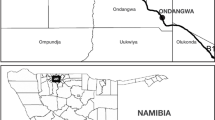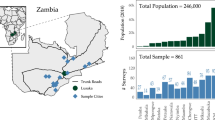Abstract
The economic revival of Msunduzi over the last decade has been driven by the influx of capital to a city that claims to offer significant advantages to the investor. This chapter examines whether this marketing ploy has enlarged the choices of the poorer residents of the city, with particular regard to their food security. Using data from the 2008–9 AFSUN baseline survey, the chapter shows that Msunduzi’s residents experience higher levels of food insecurity than like neighbourhoods in Cape Town and Johannesburg and many other cities in the SADC region. Unlike a number of these cities, the food sourcing strategies of households are severely constrained. Urban agriculture and rural–urban food transfers are limited and the informal food economy is much less significant than elsewhere. The control of the urban food system largely rests in the hands of supermarkets whose location and pricing policies put quality food outside the reach of most poor households. Although many are forced to buy supermarket food through lack of choice, food shortages and a lack of dietary diversity are endemic. Worst off are female-headed households whose levels of unemployment are higher than average and whose incomes are lower than average.
Access this chapter
Tax calculation will be finalised at checkout
Purchases are for personal use only
Similar content being viewed by others
References
Battersby, J. (2012). Beyond the food desert: Finding ways to speak about urban food security in South Africa. Geografiska Annaler: Series B, 94, 141–159.
Boakye, M., & Akpor, O. (2012). Stakeholders’ participation in water management: A case study of the Msunduzi Catchment Management. Journal of Sustainable Development, 5, 104–112.
Coates, J., Swindale, A., & Bilinsky, P. (2007). Household food insecurity access scale (HFIAS) for measurement of food access: Indicator guide (version 3). Washington, DC: Food and Nutrition Technical Assistance Project.
Crush, J., Drimie, S., Frayne, B., & Caesar, M. (2011a). The HIV and urban food security nexus in Africa. Food Security, 3, 347–362.
Crush, J., & Frayne, B. (2011a). Urban food security and the new international food security agenda. Development Southern Africa, 28, 527–544.
Crush, J., & Frayne, B. (2011b). Supermarket expansion and the informal food economy in Southern African cities: Implications for urban food security. Journal of Southern African Studies, 37, 781–807.
Crush, J., Hovorka, A., & Tevera, D. (2011b). Food security in Southern African cities: The place of urban agriculture. Progress in Development Studies, 11, 285–305.
Frayne, B. (2010). Pathways of food: Mobility and food transfers in Southern African cities. International Development Planning Review, 32, 291–310.
Gengan, D. (2006). The Msunduzi Municipality, City of Pietermaritzburg. Presentation to WIEGO Colloquium on World Class Cities and the Urban Informal Economy: Inclusive Planning for the Working Poor, University of Kwazulu Natal, Durban.
Goebel, A., & Dodson, B. (2011). Housing and marginality for female-headed households: Observations from Msunduzi Municipality (Pietermaritzburg, South Africa). Canadian Journal of African Studies, 45, 240–272.
Goebel, A., Dodson, B., & Hill, T. (2010). Urban advantage or urban penalty? A case study of female-headed households in a South African city. Health and Place, 16, 573–580.
Mutonodzo, C. (2009). The social and economic implications of urban agriculture on food security in Harare, Zimbabwe. In M. Redwood (Ed.), Agriculture in urban planning: Generating livelihoods and food security. London and Ottawa: Earthscan and IDRC.
Msunduzi Municipality. (2010). Integrated development plan 2011–2016 and beyond: Isixaxa/pulling together. Msunduzi.
Naidoo, S., Govender, S., & Green, J. (2010). The role of supermarkets in local government and environmental and socio-economic sustainability. Msunduzi: MIDI Report.
Njokwe, B., & McCosh, J. (2005). African roots project. Presentation at Workshop on Urban Micro-Farming and HIV-AIDS, Johannesburg/Cape Town.
Quazi, T. (2011). An analysis of municipal approaches to incorporating the informal economy into the urban fabric. MA thesis University of Kwazulu-Natal.
Robbins, G., & Hobbs, S. (2012). Cities with jobs—confronting the employment challenge: An examination of approaches to employment in two South African case study cities. Employment Working Paper No. 127. Geneva: International Labour Office.
RUAF. (2007). Urban agriculture in Msunduzi Municipality, South Africa. RUAF Magazine, 39–41.
Simatele, D., & Binns, T. (2008). Motivation and marginalization in African urban agriculture: The case of Lusaka, Zambia. Urban Forum, 19, 1–21.
Smith, J., & Green, M. (2005). Free basic water in Msunduzi, KwaZulu-Natal: Is it making a difference the lives of low-income households? Water Policy, 7, 443–467.
SRK Consulting. (2010). Msunduzi Municipality: Draft strategic environmental assessment (Report No. 376998/DSEA). Msunduzi.
SSA. (2012). Census 2011: Municipal report Kwazulu-Natal (Report No. 03-01-53). Pretoria: Statistics South Africa (SSA).
Swindale, A., & Bilinsky, P. (2006). Household dietary diversity score (HDDS) for measurement of household food access: Indicator guide (version 2). Washington, DC: Food and Nutrition Technical Assistance Project.
Van Zyl, J., Cross, C., & O’Donovan, M. (2008). Overview of the extent and nature of the unbundling of South African households and the implications thereof. Pretoria: Report Commissioned by the South African Presidency.
Author information
Authors and Affiliations
Corresponding author
Editor information
Editors and Affiliations
Rights and permissions
Copyright information
© 2016 Springer International Publishing Switzerland
About this chapter
Cite this chapter
Caesar, M., Crush, J. (2016). Food Access and Insecurity in a Supermarket City. In: Crush, J., Battersby, J. (eds) Rapid Urbanisation, Urban Food Deserts and Food Security in Africa. Springer, Cham. https://doi.org/10.1007/978-3-319-43567-1_4
Download citation
DOI: https://doi.org/10.1007/978-3-319-43567-1_4
Published:
Publisher Name: Springer, Cham
Print ISBN: 978-3-319-43566-4
Online ISBN: 978-3-319-43567-1
eBook Packages: Social SciencesSocial Sciences (R0)




